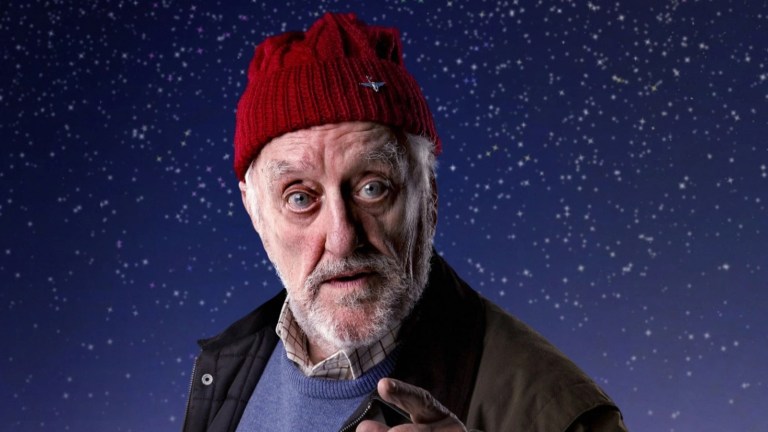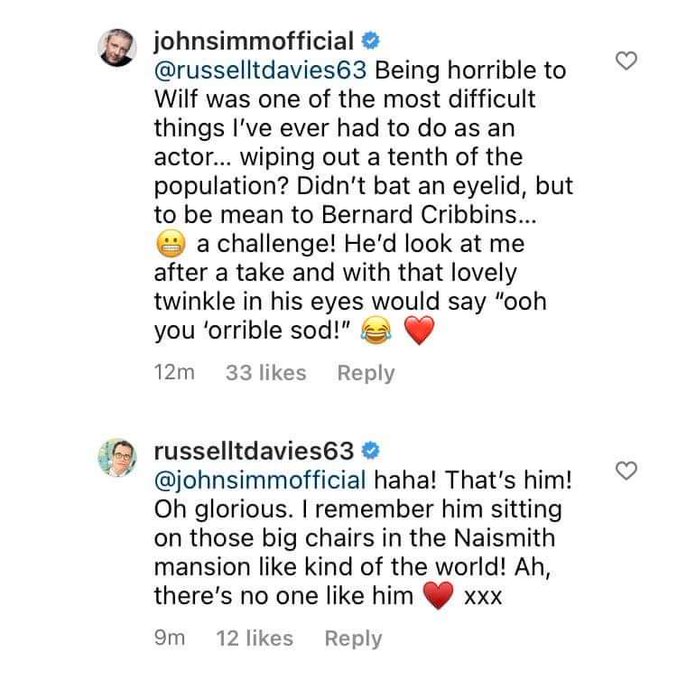Doctor Who: What Bernard Cribbins’ Wilfred Mott Meant to the Show and Fans
We remember Bernard Cribbins and what he brought to Doctor Who as companion Wilfred Mott.

Nine. That’s the number of Doctor Who episodes that Wilfred Mott has appeared in so far. Just nine. And he was nearly in none.
Bernard Cribbins, a legend who spent seven decades acting and entertaining after joining a theatre club in Oldham as Assistant Stage Manager aged 14, was cast in “Voyage of the Damned” as Stan, selling newspapers from a kiosk as the aliens of the starship Titanic beam down and away again. It was intended as a cameo appearance only, but Howard Attfield was ill. Due to return as Donna Noble’s dad Geoff, Attfield filmed some scenes for Series 4 opener “Partners in Crime” before retiring from the role. He died shortly afterwards.
Behind the scenes, there had been hope that Attfield would have been able to act in the Sontaran two-parter, but his condition deteriorated and his wife said he could not carry on. It was at this point, before “Voyage of the Damned” had even been broadcast, that Russell T. Davies recalled his original companion outline featured a stargazing grandfather character, and producer Phil Collinson suggested Cribbins could play him after the actor had got on so well with everyone during the night-time location filming. The character was christened Wilf, and the credits to “Voyage of the Damned” duly amended. Wilfred Mott was created through pragmatism against a backdrop of tragedy, an inspired decision from Collinson based on Cribbins’ infectious enthusiasm and ability to entertain.
The length of his career also means he’s a beloved figure to multiple generations who watched and heard him when they were young: The Railway Children, The Wombles, Jackanory, Paddington, The Snowman, and Doctor Who – he crossed over to lots of audiences and they were always glad to see him. As someone who worked in Repertory Theatre and then did a lot of narration and voiceover, Cribbins was versatile. He may have been a clown, but he could do a bit of everything (as narrators often have to) and knew the tonal shift from comedy to tragedy (his service history on paradata.org.uk demonstrates this, featuring both comedy and horror, and somehow getting his hand impaled on his own bayonet in front of Field Marshal Montgomery).
There was a lot of Cribbins in Mott. Sure, as an actor he could play small, petty men for Alfred Hitchcock and John Cleese, step into Sinatra’s shoes for Guys and Dolls at the National, or even Gertrude Stein in Swedish surrealism, but the key thing everyone says about Cribbins is how immensely likeable he was. The Master himself, John Simm, even spoke about how hard he found it to be cruel to Wilf:

He brought in little touches like sprigs of holly from his garden or the Parachute Regiment badge as headwear accessories, making suggestions like Wilf shooting a paintball gun at a Dalek. Cribbins’ life experience also informed Wilf’s character, the young man in post-World War Palestine watching the haze of bullets and feeling lost in the midst of chaos. That this old monarchist bringing the Doctor a gun remains a beloved character is a testament to the sheer likeability of the actor and how Russell T. Davies shaped the character based on the casting. While Davies and his writers were giving Catherine Tate some great material to show her range, they were building up Wilf with his and Donna’s very pure, supportive relationship (with Donna’s Mum and Wilf’s daughter Sylvia being a pivotal if less endearing unifying figure for them both).
Consider Wilf’s role as Donna’s grandfather. Even allowing for the fact that the character replaced Donna’s father late in the day, there aren’t many predecessors in the show’s history: Jamie, Victoria, Adric, Nyssa, Tegan, Turlough, and Peri have family members appear onscreen, but they weren’t used to the same extent (mostly being seen in one story only, dying, and then providing some occasional semblance of pathos). Other companion’s relatives who appeared frequently had a more fractious relationships (Rose and Martha don’t have the same level of supportive relationship in the previous three series to Wilf and Donna). In fact the closest thing the show has come to Wilf and Donna’s relationship previously is the First Doctor and Susan, which was a mix of paternalistic, fractious, and wholesome. As with William Hartnell in the ’60s, children watching the show in the late 2000s had found another grandfather, and would approach Cribbins in the street in that spirit.
Wilf also functions as a surrogate father figure for the Doctor, while simultaneously mirroring the character: they’re both older men who know their time is up soon, haunted by past conflict, but ready to step up and do the right thing. In many ways Wilf is the more straightforwardly heroic figure, fighting to save what he loves and stepping in to save an unnamed scientist in “The End of Time” without a moment’s hesitation. The Doctor, on the other hand, does the right thing and saves Wilf in turn but only after bitterly lamenting what it’ll cost him (a lot less then it’d cost Wilf). If it wasn’t Wilf needing rescue, then frankly there’s an element of doubt over what the Doctor would have done. Yet Wilfred Mott’s faith isn’t diminished, because he knows what the Doctor did for Donna and can do for others. If you’re on the chaotic side, it’s no wonder that Wilf provides a stellar father figure, someone who you can actually be quieter and vulnerable with. This extended beyond the characters and into fandom too.
Put simply “The End of Time” falls apart without Wilfred Mott in the companion role. It simply would not work at all. Its strongest scenes are all built on the strength of Cribbins’ performance and his control of dynamics. Wilf is emotionally honest – in all his scenes where he’s doing a bit of business and being an affable granddad, he means it in the moment – and this means when his fear comes to the surface he’s equally unabashed. There’s no sugar coating the pain in lines like “But she was better with you” and “I don’t want you to die.” If Bernard Cribbins was on screen and crying, you’d better believe the audience was weeping too.
When Cribbins’ death was announced the news landed heavily. We saw the same gifs and jpegs across social media, of Wilf saluting or Wilf not quite being able to wave goodbye, and the increased melancholy of the “I’m going to die” café scene that was going around in screengrab form. Then the fan art came in waves. So many quotes. The outpouring was colossal. It crossed generations.
Doctor Who often has an air of wish-fulfilment, it’s a show that requires joy and can’t end too bleakly. Davies gave his characters fantastic journeys but compromised endings, and so we see the Doctor leaving Wilf choking with emotion as Donna and her family are left financially secure, and the Doctor leaves them forever (or so it seemed). Even with Donna losing her memories of her travels with the Doctor, the ones that “made her better” in Wilf’s words, there’s some gesture of condolence for the heartbreak. Which is deserved, frankly, considering the faith Wilf shows in the Doctor and Donna.
They’re not perfect, not by a long shot, but this man – whose daughter won’t let him get a webcam because she thinks they’re naughty – is quietly as heroic as them both. Who wouldn’t want someone like Wilf in their corner?
